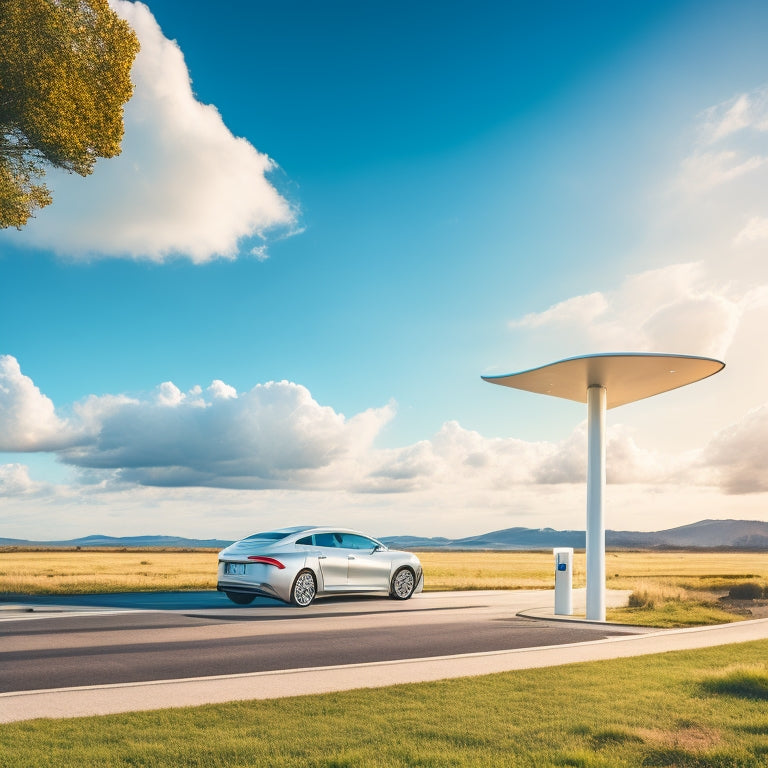
Find Your Nearest Electric Vehicle Charging Station
Share
You can easily find your nearest electric vehicle charging station through various online tools, mobile apps, and networks operated by companies like ChargePoint, EVgo, and Electrify America. Use online directories, mobile apps, or websites like PlugShare, ChargeHub, and Open Charge Map to locate public charging stations near you. You can also search for urban EV charging hotspots, highway rest stop charging locations, or mall and shopping center charging stations. Start exploring your options now and discover more about electric vehicle charging infrastructure tailored to your needs.
Key Takeaways
• Use online tools or mobile apps like PlugShare, ChargeHub, or Waze for EVs to find your nearest electric vehicle charging station.
• Filter search results by location, charger type, and availability to find a convenient charging spot.
• Check if your preferred charging station is part of a network like ChargePoint, EVgo, or Electrify America for a seamless experience.
• Look for charging stations at highway rest stops, urban hotspots, malls, or shopping centers for easy access.
• Plan your route in advance using route planning tools to ensure a smooth and stress-free journey with convenient charging stops.
Public EV Charging Station Networks
You can access public EV charging station networks, which are operated by companies like ChargePoint, EVgo, and Electrify America, offering a convenient and widespread charging infrastructure across the country. These networks provide a reliable and standardized charging experience, ensuring that you can charge your vehicle efficiently and safely. Network significance is essential, as it guarantees that charging stations are always available and functioning properly. Station standardization is also vital, as it allows for seamless communication between the charging station and your vehicle, ensuring a smooth charging process.
When using public EV charging station networks, you can expect a high level of reliability and standardization. This means that you can charge your vehicle quickly and efficiently, without worrying about compatibility issues or station downtime. With companies like ChargePoint, EVgo, and Electrify America, you can be confident that you'll have access to a reliable and standardized charging experience, no matter where you're in the country.
Highway Rest Stop Charging Locations
Along highways, nearly 100 rest stops and welcome centers now offer electric vehicle charging stations, providing a convenient and strategic location for drivers to recharge during road trips. You'll find these rest stops along major highways, allowing you to take a break from driving while your vehicle charges.
These roadside refueling stops often feature Level 2 and DC Fast Charging stations, capable of replenishing your battery to 80% in under 30 minutes.
When you're planning a road trip, it's essential to identify rest stops with EV charging stations along your route. You can use online tools or mobile apps to find these locations and even filter by amenities like food, restrooms, and picnic areas.
With more rest stops adding EV charging infrastructure, you'll have greater flexibility when planning your route. Take advantage of these convenient roadside refueling stops to minimize downtime and maximize your travel time.
Urban EV Charging Hotspots
As you explore urban EV charging hotspots, you'll discover that city centers are prime locations for charging hubs. High foot traffic and dense infrastructure make them ideal for supporting a large number of EV owners.
You'll also find urban EV corridors, which are designed to facilitate easy charging along frequently traveled routes.
Meanwhile, metro stations are being repurposed as convenient charging points, making it easy for commuters to top up their batteries on the go.
City Center Charging Hubs
City centers are transforming into electric vehicle charging hubs, where high-power charging stations are strategically located to cater to the growing demand for convenient and rapid EV charging. As you navigate through urban landscapes, you'll notice a deliberate integration of EV charging infrastructure into city planning and urban design.
This intentional design guarantees that charging stations are easily accessible, often situated near popular destinations, public parking, and transportation hubs.
You'll find that city centers are being redesigned to accommodate EV charging stations, with designated parking spots and clear signage. This thoughtful urban planning allows you to charge your vehicle while you're running errands, grabbing a bite, or attending to personal matters.
With the increasing adoption of electric vehicles, city centers are evolving to support this shift, providing a seamless and convenient charging experience. By incorporating EV charging infrastructure into urban design, cities are creating a more sustainable, efficient, and driver-friendly environment.
As you explore city centers, you'll discover a growing network of charging stations, making it easier than ever to own and operate an electric vehicle.
Urban EV Corridors
Urban planners and transportation officials are strategically identifying and developing urban EV corridors, high-demand areas where charging infrastructure is concentrated to support the growing number of electric vehicles on the road.
As you navigate your city, you'll find that these corridors are often situated along highways, interstates, and other high-traffic routes. By clustering charging stations in these areas, urban planners aim to reduce range anxiety and make EV ownership more practical.
These urban EV corridors are a key component of green infrastructure, designed to minimize environmental impact while promoting sustainable transportation. You'll often find them integrated into existing transportation hubs, such as rest stops, parking garages, and shopping centers. By doing so, urban planners can maximize accessibility and convenience for EV owners.
As you explore your city's urban EV corridors, you'll notice a concentration of charging stations, often with high-power fast-charging capabilities. This strategic planning enables you to quickly recharge and get back on the road, making electric vehicle ownership a more viable option.
Metro Station Charging
Metro stations have emerged as strategic locations for charging hotspots, offering EV owners convenient access to high-power charging infrastructure while they commute. You can now charge your vehicle while waiting for your train, making the most of your downtime. This development is a game-changer for urban EV owners, who often face limited charging options in densely populated areas.
With metro station charging, you'll enjoy hassle-free Station Access, reducing your reliance on public charging networks.
As Metro Expansion continues to shape urban landscapes, EV charging infrastructure is being seamlessly integrated into these hubs. This synergy enables you to kill two birds with one stone – commute and charge – making EV ownership more appealing than ever.
Workplace Charging Station Incentives
When considering workplace charging station incentives, you'll want to evaluate the costs associated with installing and maintaining charging infrastructure.
You'll also want to explore the various employer incentives offered, such as tax credits and utility rebates, to offset these costs.
Additionally, understanding the installation process, including permits and inspections, will help you navigate the implementation of a workplace charging station.
Charging Station Costs
You can greatly reduce the cost of installing a workplace charging station by taking advantage of incentives offered by government agencies, utilities, and employers. These incentives can substantially lower the upfront cost of purchasing and installing a charging station, making it more feasible for your workplace to support electric vehicles.
When considering the cost of a charging station, it's crucial to make a cost comparison. Station pricing varies greatly, ranging from a few hundred dollars for a basic Level 1 charger to over $10,000 for a high-power DC Fast Charger. The cost of installation, maintenance, and any necessary upgrades or replacements must also be factored into your overall budget.
To get a better understanding of the costs involved, research the different types of charging stations and their corresponding prices. Compare the costs of different models and brands to find the most cost-effective option for your workplace.
Employer Incentives Offered
Many employers offer incentives to offset the cost of installing and maintaining workplace charging stations, recognizing the benefits of supporting their employees' electric vehicles. As an employee, you can benefit from these incentives, which can make owning an electric vehicle more practical and cost-effective. These employer incentives can include reimbursements for charging, preferred parking for electric vehicles, and even free charging.
Here are some examples of employer incentives:
| Incentive | Description | Benefits |
|---|---|---|
| Reimbursement for Charging | Employers reimburse employees for charging their vehicles at work. | Reduced charging costs for employees. |
| Preferred Parking | Designated parking spots for electric vehicles, often closer to the building. | Convenience and time-saving for employees. |
| Free Charging | Employers offer free charging for employees at the workplace. | Significant cost savings for employees. |
| Special Perks | Some employers offer additional perks, such as access to car-sharing programs or on-site car washes. | Enhanced employee benefits and corporate perks. |
These incentives not only benefit employees but also contribute to a positive corporate image, demonstrating a commitment to sustainability and employee satisfaction. As you consider purchasing an electric vehicle, be sure to ask your employer about available incentives.
Installation Process
To install a workplace charging station, employers typically follow a multi-step process. The first step involves evaluating the electrical infrastructure. You'll need to assess whether it can support the additional power load of EV charging, which may entail upgrading your electrical panel or installing a new electrical service.
After evaluating the infrastructure, the next step is to select the right equipment for the workplace charging station. Consider factors such as charging speed, connector type, and network integration. It's crucial to choose equipment that complies with local building codes and safety standards.
Once you have chosen the equipment, the next step is to obtain the necessary permits from local authorities. Permit requirements can vary depending on the jurisdiction, so it's essential to research the specific regulations in your area.
The installation timeline for the workplace charging station can vary based on the project's complexity. Typically, the installation process ranges from a few weeks to a few months, depending on various factors.
Mall and Shopping Center Charging
Shopping centers and malls are increasingly installing electric vehicle charging stations, recognizing the opportunity to attract eco-conscious consumers and enhance their overall shopping experience. As you visit your favorite mall, you can now charge your EV while you shop or dine.
Many malls are incorporating charging stations as part of their amenities, offering a convenient and time-saving experience for EV owners like you. Some malls even offer retail incentives, such as discounts or rewards, to encourage customers to visit and charge their vehicles.
When you charge your EV at a mall, you can expect a seamless experience. Many charging stations are Level 2, providing a faster charging speed than a standard outlet. You can easily locate charging stations using online directories or mobile apps, making it easy to plan your shopping trip around your EV's charging needs.
With more malls adding charging stations, you can expect a convenient and enjoyable shopping experience that caters to your eco-friendly lifestyle.
Government Incentives for EV Owners
You can take advantage of government incentives that encourage the adoption of electric vehicles, such as tax credits, rebates, and exemptions, which can help offset the higher upfront cost of purchasing an EV. These incentives can greatly reduce the financial burden of owning an electric vehicle, making it more accessible to a wider range of consumers.
For instance, the federal government offers a tax credit of up to $7,500 for the purchase of a qualifying EV. Additionally, many states and local governments offer rebate programs, which can provide further financial assistance. Some states offer rebates of up to $5,000 for the purchase of an EV.
Residential EV Charging Solutions
As you consider residential EV charging solutions, you'll want to explore two key areas: home charging installations and EV ready homes.
Home charging installations involve setting up a charging station at your residence, which can be a convenient and efficient way to recharge your vehicle.
You'll also want to look into EV ready homes, which are designed with electric vehicle charging infrastructure already in place, making it easy to plug in and charge your car.
Home Charging Installations
Installing a home charging station can greatly reduce your electric vehicle's charging time and provide a convenient, reliable, and safe way to recharge your vehicle overnight. With a dedicated charging station, you can charge your vehicle up to three to five times faster than using a standard Level 1 charger. Plus, you'll have the peace of mind knowing your vehicle is charging efficiently and safely.
When selecting a home charging station, consider investing in a Smart Panel, which can optimize your energy efficiency. These advanced panels can detect when your vehicle is fully charged and redirect excess energy to other appliances in your home, reducing waste and saving you money on your energy bill.
Look for charging stations with built-in energy monitoring capabilities to track your energy usage and identify opportunities for improvement. By choosing an energy-efficient charging solution, you'll not only reduce your carbon footprint but also lower your energy costs.
With the right home charging installation, you can enjoy the convenience of charging your electric vehicle from the comfort of your own home.
EV Ready Homes
EV Ready Homes integrate dedicated electric vehicle charging infrastructure into new residential construction, providing homeowners with a convenient, safe, and efficient way to charge their electric vehicles from the moment they move in. This means you'll never have to worry about finding a charging station or dealing with messy cords again.
Here are just a few benefits you can expect from an EV Ready Home:
-
Smart Wiring: Your home will be wired specifically to support electric vehicle charging, ensuring safe and efficient energy transfer.
-
Home Automation: Your EV Ready Home will be equipped with smart home technology, allowing you to monitor and control your charging station remotely.
-
Faster Charging: With a dedicated 240-volt charging station, you'll be able to charge your vehicle up to 3 times faster than with a standard 120-volt outlet.
- Increased Property Value: Having an EV Ready Home can increase your property value and appeal to potential buyers if you decide to sell in the future.
EV Charging Station Apps and Tools
You can easily find and manage electric vehicle charging stations using various mobile apps and online tools that provide valuable features and functionalities. These tools enable you to locate nearby charging stations, filter by charging speed, and even get real-time updates on availability.
| App/Tool | Key Features |
|---|---|
| PlugShare | Charging Analytics, Route Optimization, Station Reviews |
| ChargeHub | Real-time Station Availability, User Profiles, Charging Station Filtering |
| Waze for EVs | EV-specific Routing, Charging Station Integration, Traffic Updates |
| Open Charge Map | Extensive Station Database, Filtering by Charging Speed |
| EVgo | Station Locator, Charging Analytics, Route Optimization |
These apps and tools empower you to optimize your EV ownership experience. With features like charging analytics and route optimization, you can plan your routes more efficiently, saving you time and reducing range anxiety. By leveraging these resources, you'll be well on your way to a seamless and enjoyable EV driving experience.
Long-Distance Road Trip Charging
When starting a long-distance road trip, planning your charging stops in advance is crucial to guaranteeing a smooth and stress-free journey. You'll want to contemplate your route, the distance between charging stations, and the type of charging points available.
To make the most of your trip, follow these tips:
-
Plan your route: Use route planning tools to optimize your route and identify charging stations along the way.
-
Create a trip itinerary: Break down your journey into manageable chunks, including charging stops, meal breaks, and overnight stays.
-
Check charger types: Ensure you have the right adapters and cables for the charging stations you'll be using.
- Leave some buffer time: Build in some extra time for unexpected delays or charging station closures.
Rural Area Charging Station Availability
About 80% of electric vehicle charging stations are concentrated in urban areas, leaving rural areas with limited access to charging infrastructure. As you venture into rural territories, you'll notice that charging stations become fewer and farther between. This limited rural infrastructure poses a significant challenge for electric vehicle owners who need to travel through or live in these areas.
You might be wondering, 'What about remote accessibility?' Don't worry, there's hope on the horizon. Governments and companies are working together to expand rural charging infrastructure. Incentives are being offered to encourage businesses to install charging stations in rural areas. Additionally, companies are developing innovative solutions, such as mobile charging units, to bring charging capabilities to remote areas.
While there's still much work to be done, it's essential to stay informed about the growing network of rural charging stations. You can use online resources to find charging stations near you, even in rural areas.
Frequently Asked Questions
Can I Charge My Electric Vehicle at Home Overnight?
You can charge your electric vehicle at home overnight using a standard Home Outlet and a Vehicle Adapter, which usually comes with your vehicle, making it a convenient and cost-effective option.
How Long Does It Take to Fully Charge an Electric Vehicle?
"Are you tired of waiting for your EV to charge? You'll be relieved to know that with Rapid Charging, you can fill up to 80% in under 30 minutes, depending on your vehicle's battery capacity - typically ranging from 40-100 kWh."
Can I Use Any Charging Station With My Electric Vehicle?
You'll need to check your vehicle's compatibility with various charging networks, as some stations might not work with your EV; research the network coverage to guarantee seamless charging on the go.
Are Electric Vehicle Charging Stations Wheelchair Accessible?
As you consider charging your EV, you'll be relieved to know that most stations adhere to Accessibility Standards, incorporating ramp design for effortless wheelchair access, ensuring a seamless and convenient experience for you.
Can I Reserve a Charging Station in Advance?
While you're not "station hopping" like a rockstar, you can reserve a charging station in advance, but be prepared for potential reservation fees, which might just "charge" you extra, adding to your EV's bottom line.
Related Posts
-

3 Ways to Increase Motorcycle Horsepower
You're about to unleash your motorcycle's hidden power by exploiting three key areas. First, upgrade your electric mo...
-

Best Online Solar Panel Systems for Small Homes
When choosing the best online solar panel system for your small home, consider top-rated brands like SunPower, Panaso...
-

Why Home Battery Deals Are Worth Buying Online
You're buying a home battery deal online for the same reason you wouldn't buy a car without researching online first....


